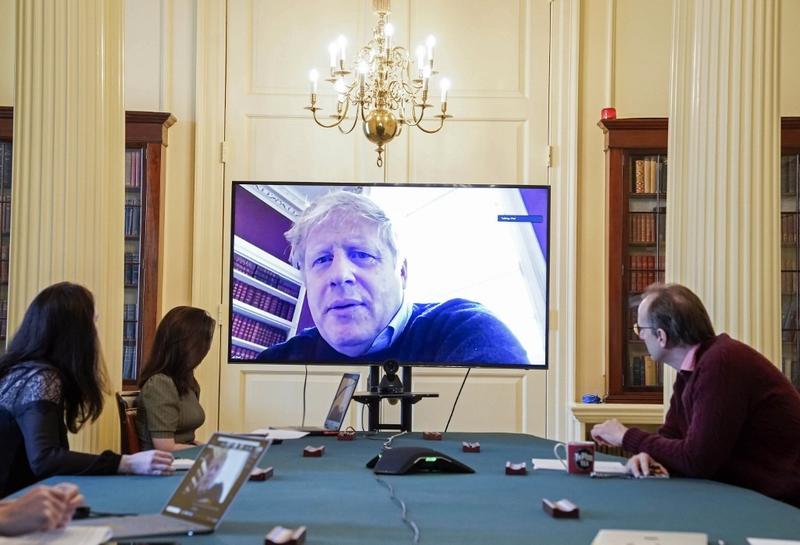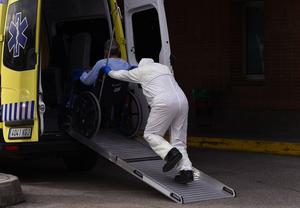 A handout picture released by 10 Downing Street, the office of the British prime minister on March 28, 2020, shows an image of Britain's Prime Minister Boris Johnson on a screen as he remotely chairs the (10 DOWNING STREET / AFP)
A handout picture released by 10 Downing Street, the office of the British prime minister on March 28, 2020, shows an image of Britain's Prime Minister Boris Johnson on a screen as he remotely chairs the (10 DOWNING STREET / AFP)
LONDON/MADRID/ROME/MONTREAL/MOSCOW/PARIS/VIENNA - British Prime Minister Boris Johnson is warning Britons in a letter to 30 million households that things will get worse before they get better, as he himself self-isolates in Downing Street to recover from the novel coronavirus.
Britain has reported 17,089 confirmed cases of the disease and 1,019 deaths and the peak of the epidemic in the country is expected to come in a few weeks.
In the letter to be delivered to homes, Johnson urges people to stick with the lockdown measures that his government has imposed to try to prevent the state National Health Service from being overwhelmed by a surge of cases.
“We know things will get worse before they get better,” Johnson writes. “At this moment of national emergency, I urge you, please, to stay at home, protect the NHS and save lives.”
Senior minister Michael Gove said on Sunday the government is “very concerned” about the death toll. He also said the country has boosted the amount of testing for the virus.
“The number of tests being carried out has hit 10,000 a day. We want to increase that to 25,000 a day.”
The UK government is loosening also its bankruptcy rules to allow struggling businesses to continue trading if they can’t pay their debts because of the impact of the coronavirus.
READ MORE: Trump stops short of quarantine threat against NY, NJ and CT
In another sign of how the pandemic is forcing governments to upend policy, Business Secretary Alok Sharma said the changes would allow British companies being reorganized to access supplies and raw materials, and not be placed into administration by creditors.
There will also be a clause that temporarily removes the threat of personal liability for company directors during the pandemic.
Italy, Spain look for answers
Italy’s coronavirus death toll topped 10,000 and Spain reported its deadliest day yet, leaving leaders of both countries groping for ways to tackle the crisis with Europe split along economic fault lines.
While the data suggest the pace of infections may be leveling off, the human carnage and economic damage aren’t letting up. Spain recorded 832 deaths on Saturday, though Italy’s fatal cases slowed to 889 from a Friday record of 969.
With the goal of “flattening the curve” at stake, Italy’s Giuseppe Conte and Spain’s Pedro Sanchez took to the national airwaves with comments that raised the level of unease.
 A hospital worker wheels a coronavirus patient into a waiting ambulance to be taken to another sanitary center at the Severo Ochoa hospital, March 27, 2020 in Madrid, Spain. (DENIS DOYLE / GETTY IMAGES VIA BLOOMBERG)
A hospital worker wheels a coronavirus patient into a waiting ambulance to be taken to another sanitary center at the Severo Ochoa hospital, March 27, 2020 in Madrid, Spain. (DENIS DOYLE / GETTY IMAGES VIA BLOOMBERG)
Conte stopped short of an expected extension of Italy’s nationwide lockdown, a step that seems unavoidable given the suffering. Sanchez muddied the waters by saying non-essential workers would be kept home over the Easter period, sowing doubt on what kind of lockdown Spain has been in for two weeks.
Instead, both leaders amped up their criticism of the European Union for being slow and failing its hardest-hit members in the hour of their greatest economic need. Both were at pains to remind the EU of its responsibilities.
ALSO READ: Passengers on ‘Death Ship’ plead for rescue after virus strikes
Sanchez repeated his call for a European “Marshall Plan,” a reference to the US aid program credited with pulling Western Europe out of its post-World War II economic devastation.
‘European solidarity’
Almost 15,000 coronavirus victims — more than half the world’s total — have been reported in Italy and Spain, which officially are in almost total lockdown except for essential errands such as buying food and medicine.
While Italian Deputy Finance Minister Laura Castelli told La Stampa that the government’s crisis aid package could increase to as much as 100 billion euros (US$111 billion), that compares with 750 billion euros mobilized by Germany and 300 billion euros in France.
Conte and Sanchez joined French President Emmanuel Macron in advocating a hefty joint EU response, exposing an EU rift dating back to the euro-area debt crisis.
“We won’t overcome this crisis without strong European solidarity, both on the health front and on the budget front,” Macron said in an interview with Italian newspapers. “The amount is secondary. It’s the signal that matters, be it via joint debt or a common budget.”
 A traveler walks past signage asking international travelers to self-isolate for 14 days in Vancouver International Aiport in Vancouver, British Columbia, Canada, March 17, 2020. (JENNIFER GAUTHIER / BLOOMBERG)
A traveler walks past signage asking international travelers to self-isolate for 14 days in Vancouver International Aiport in Vancouver, British Columbia, Canada, March 17, 2020. (JENNIFER GAUTHIER / BLOOMBERG)
Canada to restrict symptomatic people
Canadian Prime Minister Justin Trudeau announced new restrictions on movement Saturday in an effort to fight the spread of coronavirus.
People who show symptoms of COVID-19 will no longer be allowed to board domestic flights or passenger trains starting Monday, he said in a news conference. Social distancing measures that were implemented to fight to world-wide pandemic are starting to work, he said, citing the slowing spread in British Columbia.
Canada has recorded 4,757 cases of Covid-19 as of Saturday morning and 55 deaths from the disease, government data show.
Russia to close borders
Russia, the largest country by area, will temporarily shut all its borders starting March 30 after the number of coronavirus infections increased sharply over the last week. Health officials on Saturday reported 228 new cases of coronavirus overnight, bringing the total to 1,264, with four deaths attributed to the illness.
Toughest weeks ahead for France
The next two weeks will be the toughest yet in the fight against coronavirus in France, Prime Minister Edouard Philippe warned Saturday as his government raced to add intensive care beds and source protective gear.
The outbreak initially took hold in eastern France, where hospitals have become overwhelmed, and has been spreading west. Doctors in the greater Paris region have said their intensive care units will be full by the end of the weekend.
“We are fighting a battle that will take time,” Philippe said at a news conference. “The first two weeks of April will be harder than the two we have just lived through.”
By Saturday, the coronavirus had claimed 2,314 lives in France, with more than 37,575 confirmed cases, according to official figures.
Swiss toll hits 257
The Swiss death toll from coronavirus has reached 257, the country’s public health agency said on Sunday, up from 235 people the previous day.
The number of confirmed cases also increased to 14,336 from 13,213 on Saturday, it said.
Senegal sees 12 more cases
Senegalese Ministry of Health and Social Action on Sunday reported 12 new cases of COVID-19, bringing the country's total number of cases of infection to 142.
Minister of Health and Social Action Abdoulaye Sarr said among 151 tests done, 12 came back positive, including four imported cases and eight close contacts of earlier confirmed patients.


